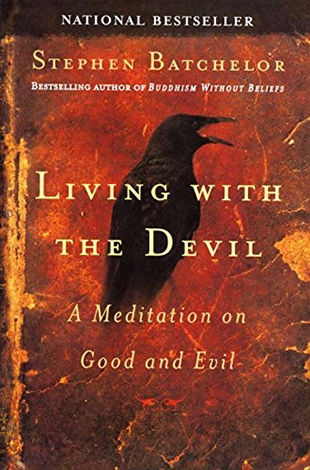Stephen Batchelor is a former monk in the Tibetan and Zen traditions who has practiced Buddhism for the past 30 years. He is the author of the bestselling book Buddhism Without Beliefs. Given the contemporary obsession with terrorism, and the prospect of a swift and sudden death, many people are thinking more seriously about the nature of good and evil and the existence of the devil. Although we are all familiar with the significance of these weighty themes in Christianity, there has been less written about this subject in Buddhism. Batchelor offers his meditation on the many faces of evil. He spices the proceedings up with quotations from John Milton, mythology, and evolutionary biology.
Here is the Buddhist perspective in a nutshell: "The infinitely poignant beauty of creation is inseparable from its diabolic destructiveness. How to live in such a turbulent world with wisdom, tolerance, empathy, care, and nonviolence is what saints and philosophers have struggled over the centuries to articulate. What is striking about the Buddhist approach is that rather than positing an immortal or transcendent self that is immune to the vicissitudes of the world, Buddha insisted that salvation lies in discarding such consoling fantasies and embracing instead the very stuff of life that will destroy you."
This tradition uses the figure of Mara to explore the precariousness of existence via the devil of psycho-physical existence, the devil of compulsions, the devil of death, and the devil who is born of a god. This figure works as an inner enemy that must be accepted and embraced rather than avoided and dreaded.
In one of his musings, Batchelor discusses the devil as anything that obstructs the achievement of freedom. No wonder the Greek word for devil is "one who throws something across one's path." But perhaps the most enlightening perspective in the book is the author's contention that the acceptance of the many mysteries that swirl around us is to live with the devil. As he puts it: "To live with the devil is to plunge into this elusive, beguiling, obstructive, giddying, unreliable, bewitching, sublimely ephemeral world." This means that we cannot control what happens to us or cut ourselves off from others and the wild and wonderful earth. Like the Buddha, we accept our limitations and remain aware, open, and free in the face of the unknown. This meditation on good and evil makes mystery most magnificent as a survival tool.
